UC People: Crystal Wiley Cené, health equity leader
Share This Article
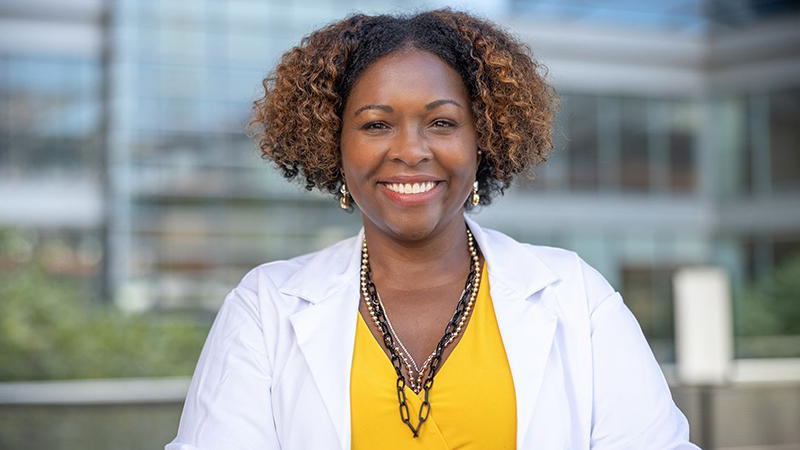
By Michelle Brubaker, UC San Diego
Crystal Wiley Cené, MD, MPH, grew up in Sneads Ferry, a small coastal town in North Carolina where the nearest medical center was 40 miles away, and a strong sense of community was formed on the front porches of her neighborhood. She recalls many impactful conversations growing up that took place in front of her house with family, friends and community leaders. Those pivotal moments instilled a deep curiosity in her and an early passion for serving her community.
Cené credits her identities as a daughter and granddaughter for shaping her life and all the paths she has chosen, where the common theme is helping the underserved and marginalized. She has been part of the National Association for the Advancement of Colored People (NAACP) since the age of 8. Driven by profound personal experiences and motivation to improve public health, Cené has become a nationally recognized health services and health disparities researcher.
Her research is centered on evaluating and implementing solutions that enhance patient and family-centered care, focusing on disparities by race and socioeconomic status. She has authored more than 85 peer-reviewed publications and mentors students, trainees and junior faculty.
Cené is the chief administrative officer for health justice, equity, diversity and inclusion (JEDI) at UC San Diego Health and serves as the associate chief medical officer for health equity. In this dual, complementary role, she’s working to create an equitable, diverse and inclusive environment for students, trainees, faculty, staff and patients.
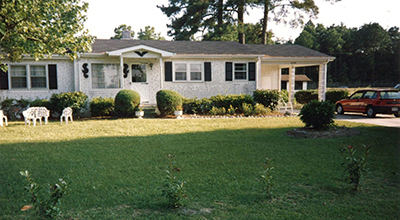
Dr. Cené learned about the importance of community at an early age by listening to conversations between her grandfather, neighbors and community leaders at her grandparent’s home in Sneads Ferry, North Carolina. (Photo: Dr. Cené)
She is responsible for the vision, leadership and strategic planning of UC San Diego Health JEDI efforts and initiatives, partnering closely with leaders within the organization to ensure anti-racist, equitable, diverse and inclusive strategies, programs and policies are implemented across the health system. She brings extensive leadership, research, teaching and clinical experience to her position.
In this Q&A, Cené describes how both personal and professional experiences continue to be motivators and have driven her to an accomplished career with a focus on health equity.
How did your childhood determine your career path?
My mom was only 17-years-old when she had me. She married my dad, but when the marriage ended, I moved in with my mom’s parents and grew up in a rural area with minimal resources in North Carolina. It was a close knit community. My grandfather was like the mayor. He was very community-focused and civically oriented. My grandfather was my role model.
The church and faith were also a foundation in our family. It was another place where community came together and set the example of the importance of service and being there for each other.
My mom went to nursing school while I was in high school. I worked at one of the only black doctor’s offices in my town during that time, and once my mom started to work in the hospital setting, I would visit her. I spent a lot of time with my mom in the hospital, watching her care for others. My mom said I declared wanting to be a doctor in the third grade. Now looking back, that time with my mom in the hospital was the beginning of my health care career.
My grandfather developed chronic illnesses, including diabetes and end stage renal disease over the years. Seeing him go through that drew me even closer to becoming a doctor.
I remember moments in his hospital room when we were dismissed by medical staff. It was frustrating. Being by his side during his health journey showed me how critical it is to be your own health advocate and to use your voice to be heard, valued and make a difference, whether for yourself, a loved one or on a larger scale for communities and patient populations. He passed away from cardiovascular disease and I am reminded of his life daily. He remains a central part of who I am and the decisions I make for patient advocacy and health equity.
In my last year in college, I received a scholarship to work in Africa on a public health research project. I lived there for three months, visiting remote villages that did not have health care. Ghana has the highest maternal mortality and morbidity rates. I witnessed mothers dying during childbirth by bleeding out and not having access to life-saving, high-quality health care. I truly learned the importance of community and engagement through that experience. It changed my life and was a driving force for my future.
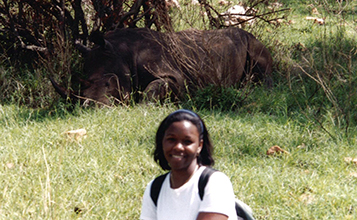
Dr. Cené, as a child, with a rhinoceros in Ghana. It was on this trip to Africa that she fell in love with public and community health. (Photo: Dr. Cené)
I completed my medical degree at East Carolina University and residency at Yale University. I completed a three year clinical research fellowship and received my Master degree in Public Health from John Hopkins University.
I owe all of this to those conversations on the front porch all those years ago.
What brings you the most pride in your career?
I am most proud of the fact that, somewhere along my journey, I developed the courage to speak up for individuals and communities who are often unseen, unheard and disfavored.
As a child, I was very shy and barely spoke. I am grateful to be in leadership positions that allow me to elevate the voices, perspectives and concerns of individuals and communities who otherwise may not be heard.
I recognize the tremendous privilege and responsibility I have as a black, female physician and executive leader to ensure that all individuals, including those from historically marginalized and minoritized backgrounds, have the opportunity to live a full life and enjoy good health.
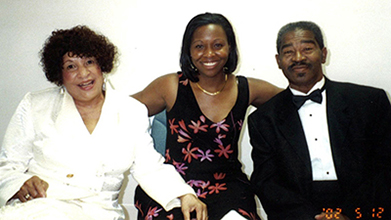
Dr. Cené with the grandparents who raised her. (Photo: Dr. Cené)
How does your role at UC San Diego Health address health equity?
As the chief administrative officer for JEDI, my team sets the vision and strategy for clinical leaders in the broad space of health equity. Health equity for our patients and communities is our true north.
We know that there are social and cultural barriers that prevent people from receiving quality care. We look at drivers, such as food insecurity, housing, transportation, and financial strains. For example, does the patient have the means to buy medications? All of these aspects impact health.
We intentionally think about the social structures that may prevent opportunities for patients to be healthy. High quality health care should be equal. We need to ensure that different patient populations and team members are experiencing the same good outcomes.
Dismantling structural racism is now an official priority within the UC San Diego Health strategic framework. In addition, we are taking immediate action to affirm our health system’s commitment to EDI through a health equity steering council, which includes multiple embedded work streams and trainings within the health system to implement long-term change.
JEDI is launching two exciting programs: a mobile health program designed to bring health care directly to individuals living in under-resourced communities and who face many barriers to health, and a program designed to build-up economic resources in local communities through hiring locally and using local suppliers and vendors.
Mobile health programs have been used across the nation and in San Diego County to help people access health care by bringing care directly to the community — they are like having a health clinic on wheels. Taking health care to the community via mobile units can make a significant difference in the lives of people who face barriers to accessing health care, such as lack of childcare or transportation.
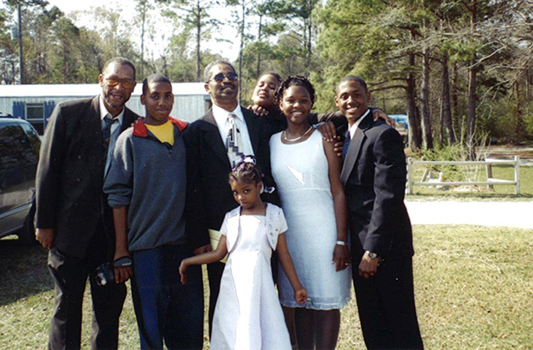
Despite their effectiveness, there are only 2,000 mobile health clinics in the entire country and only two mobile units in San Diego that provide breast screening. The UC San Diego Health mobile health program is planned to launch in the fall of 2024 with two mobile units, a mammography unit and a general mobile unit. The general mobile unit will start with delivering urgent care services in the South Bay and prenatal and post-partum care to Haitian and Somali communities. The mobile health programs are not just focused on treating illnesses; they are about connecting people with resources that promote health. Through education, outreach, and community partnerships, the UC San Diego Health mobile health programs aim to create a culture of health and wellness so that all San Diegans have what they need to survive and thrive.
More broadly, as an academic medical center that is part of the University of California, we are committed to caring for our community — all of our community — through new science, new medicines and new cures. Through equity, diversity and inclusion initiatives, we address factors within our health system and across our community that contribute to health inequities. Thus, this work is important to our core mission of caring for our community.
How do we continue transparent conversations about health equity to make real change?
Thinking about the ways we can support our most vulnerable patients keeps me up at night.
First, it is critical to acknowledge areas of improvement and to provide a safe space to talk about how to resolve the issues. We fulfill this vision through a series of coaching, education and open dialogue about race/racism for clinical teams and leaders throughout the health system.
The principles of health equity at UC San Diego Health aim to reduce, and ultimately eliminate, health inequities in our community and their root causes, including unmet needs within the social determinants of health. Social determinants of health are non-medical factors (such as where a person lives, employment and education) that influence a person’s health.
We need to continue to invest in the health and sustainability of our communities and address the conditions in the social and physical environments that negatively affect the health of community members, including our patients.
One particular need that may go unmet and can cause challenges in settings with a lot of diversity is the need to receive care in the language you prefer to speak. I regularly remember how helpless and disconnected I felt when I lived in Ghana and Kenya and did not speak the native language. Some patients experience language barriers on a regular basis. I imagine how that must feel for patients who don’t speak or understand English well to be in a hospital setting, receiving an overwhelming diagnosis or undergoing treatment for serious conditions and not quite understanding what is being said around them or the information they are being given. We have to have conversations about issues like this in order to identify solutions that ensure that all of our patients feel cared for and feel that they belong.
UC San Diego Health ensures that our patients have access to free interpretation (oral) and language services 24 hours per day, 7 days per week to help them communicate with health care providers while in the hospital or during appointments. We provide certified medical interpreters to our Limited English Proficiency (LEP) patients and their families.
Health equity can only exist when everyone, regardless of their race, ethnicity, age, preferred language gender identity, sexual orientation, ability status or socioeconomic background, has a fair and just opportunity for wellness and health.
At UC San Diego Health, we are committed to building and fostering a culture that embraces diversity of thought and allows our teams to bring their whole selves to work and serve each other, patients and community with acceptance and respect. We do this by focusing not only on delivering safe, high- quality and patient-centered health care, but by focusing on the factors within and outside of our walls that drive health.
